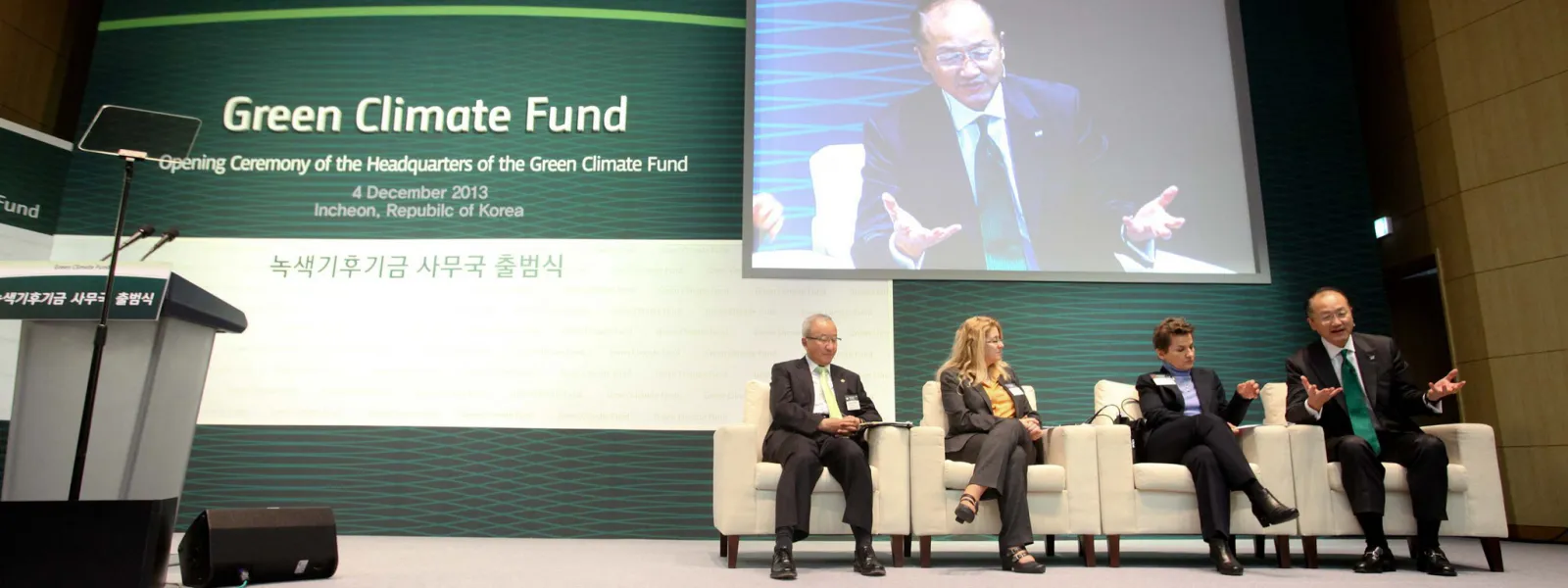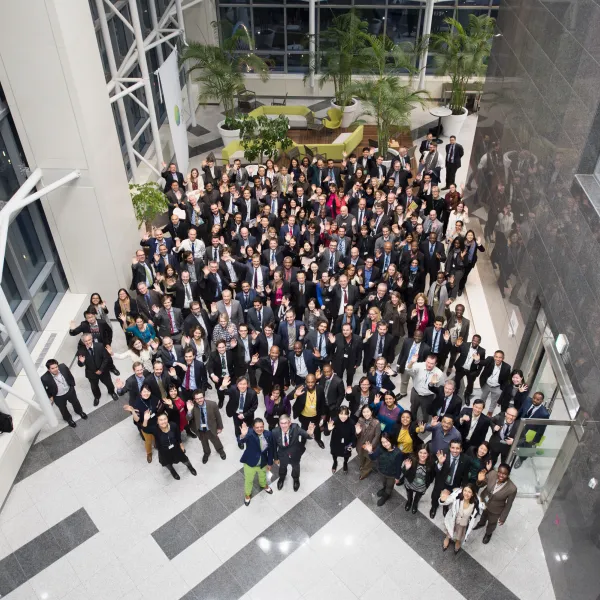
Project
Photo: GCFAdvocating before the Green Climate Fund
The Green Climate Fund is the world's leading multilateral climate finance institution. As such, it has a key role in channelling economic resources from developed to developing nations for projects focused on mitigation and adaptation in the face of the climate crisis.
Created in 2010, within the framework of the United Nations, the fund supports a broad range of projects ranging from renewable energy and low-emissions transportation projects to the relocation of communities affected by rising seas and support to small farmers affected by drought. The assistance it provides is vital so that individuals and communities in Latin America, and other vulnerable regions, can mitigate greenhouse gas emissions and address the increasingly devastating impacts of global warming.
Climate finance provided by the Green Climate Fund is critical to ensure the transformation of current economic and energy systems towards the resilient, low-emission systems that the planet urgently needs. To enable a just transition, it’s critical to follow-up on and monitor its operations, ensuring that the Fund effectively fulfills its role and benefits the people and communities most vulnerable to climate change.
Reports
Read our recent report "Leading participatory monitoring processes through a gender justice lens for Green Climate Fund financed projects" here.
Partners:

Related projects
The city, our ecosystem
By Haydée Rodríguez, legal advisor, AIDA We are witnessing the biggest wave of urbanization in history. More than half of the world’s population lives in cities. The United Nations Population Fund (UNFPA) estimates that five billion people will live in urban zones by 2030 (State of the World Population: 2007).This growth could bring opportunities to improve our lives and fight for environmental sustainability, or it could create more poverty and accelerate the destruction of natural resources. When we talk about the environment it’s easy to imagine a lush greenlandscape or a sunny beach, birds singing and perhaps an animal running free in the forest. It is less likely to visualize a cityscape of asphalt, traffic and honking horns. But it is true that the urban environment also is an ecosystem. Urban ecology: The natural order of cities Urban ecology is a relatively new scientific discipline that seeks to understand how ecological processes function inside urban areas. Unlike other branches of ecology, it requires the collaboration of the social sciences and economics to understand the dominant species of this environment: the human being. In the city, just like in other ecosystems, every aspect contributes toward its definition. The characteristics of urban habitats include traffic, air pollution, population density, movement patterns, the real estate market, infrastructure, transport and natural elements like the availability of clean water, topography and geographic location. Everything surrounding our everyday life – the streets, pavements, parks, buildings, etc. – have been created by humans. The documentary Urbanized analyzes the design challenges in cities, the interaction between different elements and how the environment influences the population. Watch Urbanized trailer. Source: YouTube Beyond chaos: Building sustainable cities Initiatives to promote sustainable cities are on the rise. In the United States, where approximately 250 million people live in urban areas, local governments have created a project called Star Communities - Sustainability Tools for Assessing and Rating Communities (STAR). Through the initiative, each municipality can evaluate the sustainability of their cities in areas ranging from infrastructure to equity and empowerment. Cities can volunteer to join the project by using the methodology for measuring sustainability developed by a multidisciplinary group. To be considered sustainable, STAR requires cities to: 1) Think and take action as a collective system; 2) Be resilient, which is defined as the city’s ability to adapt, recover and evolve in a changing environment; 3) Promote innovation and creativity; 4) Measure the progress of the health and welfare of the people, the environment and the economy; 5) Use resources in a responsible and sustainable way; 6) Collaborate between cities and inpiduals; 7) Promote equity and persity; 8) Inspire leadership; and 9) Seek continual improvement. There is no stopping the progress of growing cities. In Costa Rica, for example, there are ongoing projects like Enamórate de tu ciudad (Fall in love with your city), which aims to improve the quality of life of residents in San José, the capital. Strategies have been put in place to improve safety, promote forms of clean public transport such as bicycles, and hold activities that bring the community together to enjoy the urban environment. City lights shine increasingly brighter across the world. Now is the time to think about what we want our cities to be like. Our urban ecosystem can be an important opportunity for social mobilization (a social process organized and based on dialog to improve our quality of life), education and the empowerment of the population. It can also help us reduce our impact on natural areas and on biopersity. We should seize this positive challenge and dare to see our cities with new eyes.
Read moreMéxico failed to attend the Green Climate Fund’s fourth Board meeting
Senator Ernesto Cordero, Mexico’s representative on the Board, must be held accountable for his failure to attend a key event for establishing financial support for fighting climate change. Mexico City, Mexico. Senator Ernesto Cordero, Mexico’s representative on the Green Climate Fund (GCF) Board, missed the fourth meeting of the entity, held June 25-28 in Songdo, South Korea. At the meeting, Board members started setting the rules of operation of the Fund, a financial mechanism essential for developing countries to secure the financial support needed to combat climate change. According to the GCF Secretariat, Cordero’s absence was because he had to attend important sessions of the Mexican Congress. Also missing at the Songdo meeting was Chile, the alternate member for Mexico. Chile’s representative also informed the Secretariat of his inability to attend the event. With the absence of both of these countries, one of the seats held by Latin America on the GCF Board was left empty. The Board consists of 24 members: 12 representatives from developing countries and an equal number from developed nations. Each member has an alternate who may participate in the Board meetings without voting rights unless they assume the role of the Board member. Latin America has three seats on the Board, broken down by regional groups: Colombia is paired up with Peru, Belize with Cuba, and Mexico and Chile. Each pair also represents other countries. In this regard, Mexico and Chile’s absence from the fourth meeting jeopardizes the interests of the Latin American countries represented by the duo, which includes Brazil and Argentina. It also contradicts the active role Mexico has played in recent years in climate change negotiations worldwide. What is more, a good opportunity was missed to influence the decisions taken in South Korea. The Fund is being developed to become a main source of financial resources to combat climate change, and at this Board meeting critical decisions were taken to this end. These included decisions on the Fund’s mission, the results and performance indicators to follow, procedures for access, home ownership, financial instruments, structure and organization, among others. The formation of the Green Climate Fund must meet the needs of all regions, but especially those in Latin America. Mexico, Chile and the other countries with a seat on the Board must commit to be active and efficient participants, and to be consistent with their national policies on climate change. It is of utmost importance to ensure the involvement of Latin American governments in international spheres like the GCF because this will ensure effective benefits for the people of this region. For more information on the Green Climate Fund, visit this page.
Read moreMéxico failed to attend the Green Climate Fund’s fourth Board meeting
Senator Ernesto Cordero, Mexico’s representative on the Board, must be held accountable for his failure to attend a key event for establishing financial support for fighting climate change. Mexico City, Mexico. Senator Ernesto Cordero, Mexico’s representative on the Green Climate Fund (GCF) Board, missed the fourth meeting of the entity, held June 25-28 in Songdo, South Korea. At the meeting, Board members started setting the rules of operation of the Fund, a financial mechanism essential for developing countries to secure the financial support needed to combat climate change. According to the GCF Secretariat, Cordero’s absence was because he had to attend important sessions of the Mexican Congress. Also missing at the Songdo meeting was Chile, the alternate member for Mexico. Chile’s representative also informed the Secretariat of his inability to attend the event. With the absence of both of these countries, one of the seats held by Latin America on the GCF Board was left empty. The Board consists of 24 members: 12 representatives from developing countries and an equal number from developed nations. Each member has an alternate who may participate in the Board meetings without voting rights unless they assume the role of the Board member. Latin America has three seats on the Board, broken down by regional groups: Colombia is paired up with Peru, Belize with Cuba, and Mexico and Chile. Each pair also represents other countries. In this regard, Mexico and Chile’s absence from the fourth meeting jeopardizes the interests of the Latin American countries represented by the duo, which includes Brazil and Argentina. It also contradicts the active role Mexico has played in recent years in climate change negotiations worldwide. What is more, a good opportunity was missed to influence the decisions taken in South Korea. The Fund is being developed to become a main source of financial resources to combat climate change, and at this Board meeting critical decisions were taken to this end. These included decisions on the Fund’s mission, the results and performance indicators to follow, procedures for access, home ownership, financial instruments, structure and organization, among others. The formation of the Green Climate Fund must meet the needs of all regions, but especially those in Latin America. Mexico, Chile and the other countries with a seat on the Board must commit to be active and efficient participants, and to be consistent with their national policies on climate change. It is of utmost importance to ensure the involvement of Latin American governments in international spheres like the GCF because this will ensure effective benefits for the people of this region. For more information on the Green Climate Fund, visit this page.
Read more